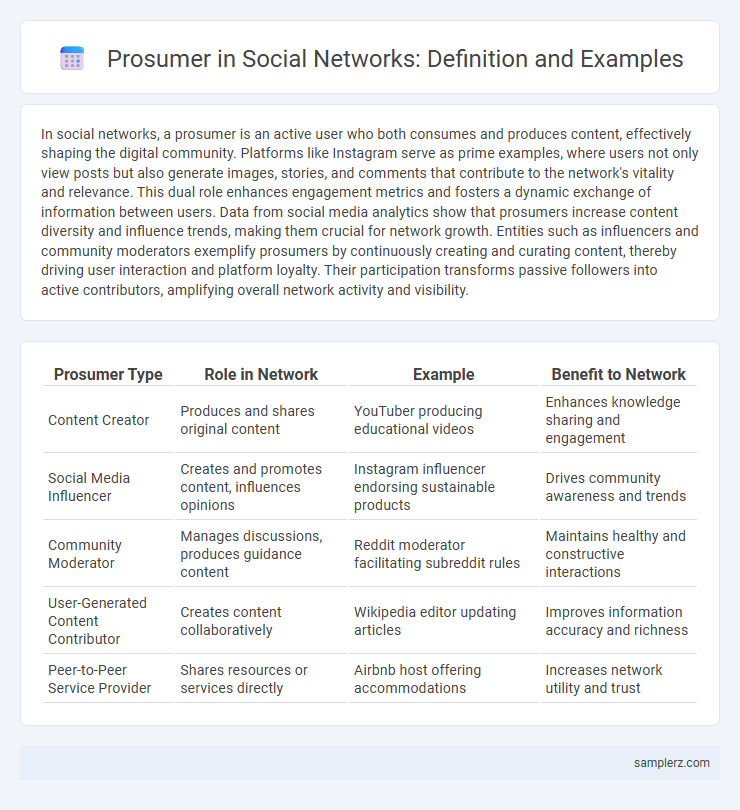In social networks, a prosumer is an active user who both consumes and produces content, effectively shaping the digital community. Platforms like Instagram serve as prime examples, where users not only view posts but also generate images, stories, and comments that contribute to the network's vitality and relevance. This dual role enhances engagement metrics and fosters a dynamic exchange of information between users. Data from social media analytics show that prosumers increase content diversity and influence trends, making them crucial for network growth. Entities such as influencers and community moderators exemplify prosumers by continuously creating and curating content, thereby driving user interaction and platform loyalty. Their participation transforms passive followers into active contributors, amplifying overall network activity and visibility.
Table of Comparison
| Prosumer Type | Role in Network | Example | Benefit to Network |
|---|---|---|---|
| Content Creator | Produces and shares original content | YouTuber producing educational videos | Enhances knowledge sharing and engagement |
| Social Media Influencer | Creates and promotes content, influences opinions | Instagram influencer endorsing sustainable products | Drives community awareness and trends |
| Community Moderator | Manages discussions, produces guidance content | Reddit moderator facilitating subreddit rules | Maintains healthy and constructive interactions |
| User-Generated Content Contributor | Creates content collaboratively | Wikipedia editor updating articles | Improves information accuracy and richness |
| Peer-to-Peer Service Provider | Shares resources or services directly | Airbnb host offering accommodations | Increases network utility and trust |
Introduction to Prosumers in Social Networks
Prosumers in social networks actively create, share, and engage with content, blurring the lines between producers and consumers. Platforms like YouTube and Instagram exemplify prosumer behavior as users generate original videos, photos, and reviews while interacting with community feedback. This dynamic fosters collaborative knowledge-building and amplifies user-driven innovation within digital social ecosystems.
Defining the Role of Prosumers Online
Prosumers online actively create and share content while consuming digital media, blending traditional consumer roles with production activities. They influence social networks by generating user reviews, participating in content creation, and engaging in collaborative projects, shaping community dynamics and information flow. Platforms like YouTube, Instagram, and TikTok exemplify prosumer-driven ecosystems where users simultaneously act as content producers and consumers.
Social Media Influencers as Prosumers
Social media influencers exemplify prosumers by actively creating and sharing original content while engaging with their audience to shape trends and opinions. They leverage platforms like Instagram, YouTube, and TikTok to generate value both as content producers and consumers, fostering interactive communities. Their dual role enhances network dynamics through direct feedback loops, brand collaborations, and viral content dissemination.
User-Generated Content Platforms
Prosumers actively contribute and consume content on User-Generated Content Platforms such as YouTube, TikTok, and Instagram, where individuals create videos, photos, and posts that shape online community interactions. These platforms leverage user contributions to generate vast amounts of data, enhancing network value and driving engagement through personalized algorithms. The continuous cycle of content creation and consumption fosters a collaborative ecosystem, making users both producers and consumers in the digital social network.
Collaborative Content Creation
Prosumers play a vital role in collaborative content creation by actively producing and sharing user-generated content on social media platforms such as YouTube, TikTok, and Reddit. These individuals not only consume content but also contribute by co-creating videos, memes, blogs, and tutorials that enhance community engagement and knowledge exchange. Platforms like Wikipedia exemplify prosumer collaboration, where users collectively create and edit comprehensive informational content.
Crowdsourced Knowledge Communities
Crowdsourced knowledge communities exemplify prosumers by actively contributing and consuming information, transforming passive users into collaborative creators. Platforms like Wikipedia and Stack Overflow enable members to generate, edit, and curate content, enhancing collective intelligence and resource reliability. This dynamic participation fosters a decentralized flow of expertise, driving innovation and democratizing access to knowledge within social networks.
Online Review Contributors
Online review contributors act as key prosumers by simultaneously consuming products and creating valuable content that influences community purchasing decisions. Platforms like Yelp and Amazon host millions of these contributors who generate authentic reviews, enhancing the network's informational value. Their participation transforms passive consumers into active content creators, driving engagement and trust within the social ecosystem.
Prosumer-driven Social Movements
Prosumer-driven social movements leverage active participation where individuals simultaneously consume and produce content, amplifying grassroots advocacy through social media platforms like Twitter and Facebook. These movements, such as the Occupy Wall Street protest and the climate change activism led by Extinction Rebellion, demonstrate how prosumers catalyze real-time information sharing and mobilization. The integration of user-generated content with collective organization creates dynamic, decentralized networks that challenge traditional top-down structures.
Peer-to-Peer Sharing Economy
Prosumers in Peer-to-Peer sharing economy networks actively participate by both offering and consuming resources, such as Airbnb hosts renting out private homes while also booking stays elsewhere. These individuals enhance decentralized platforms like Uber, where drivers provide transportation services and use the same app for personal rides. Their dual role maximizes resource utilization, fosters community trust, and drives sustainable economic growth within digital sharing ecosystems.
Future Trends for Prosumers in Social Networks
Prosumers in social networks actively create and share content while influencing platform dynamics through their engagement and feedback. Emerging trends show prosumers leveraging AI tools to personalize interactions and monetize their influence via decentralized platforms. Enhanced data ownership and privacy controls empower prosumers to drive new social economy models and shape future community governance.

example of prosumer in network Infographic
 samplerz.com
samplerz.com